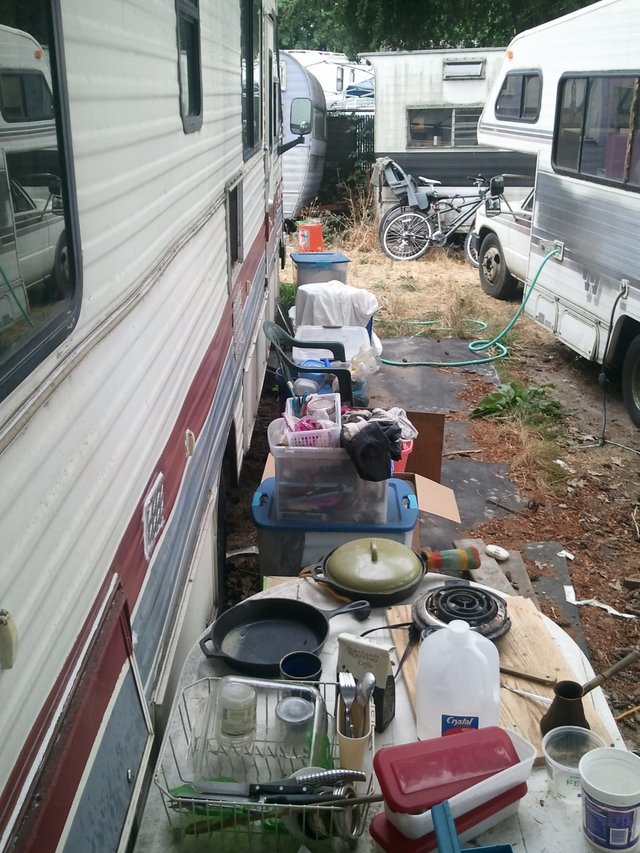We named the RV Walter after finding a coaster bearing the likeness of Walter Sobchak at a bar shortly after purchasing our tiny home on wheels.

We sold it yesterday, to the sort of person I can only hope will take good care of it and learn from past lessons (like opening the window on an electrical fire which given the fresh air supply, engulfed the last RV). Narek put care and time into patching up the leaks and repairing the interior, and when I returned from travel last summer, I felt delighted by beautiful paneling in the bathroom, a new back splash in the kitchen, and sanded cabinets that reduced the garishness of the silver paint from the previous owner. The picture below shows the cabinets removed because Narek painted them at the buyer's request.

I don't know how to tell that story with present tense, so I choose to leave it as written and move on.
I find it difficult at times to let go. This past week, I feel anxiety creeping up on me to gnaw on my guts. I wake up hungry but nauseated, at the same time. I suspect it holds a connection to personal childhood experiences, and while I wish to keep details to a minimum, I intend to list some factors that may be playing into present feelings, with some context, for the sake of recapitulation and journaling for self authorship.
Factor 1. Powerlessness in the Face of Change
Through the four major relocations I remember from childhood, I feel irrelevant to the decision making process. With parents holding a conventional mindset, where adults know best, and children's viewpoints or desires being of little consequence, I experience a minimization of my voice and my desires. This occurs in daily life choices with my mother, growing up: she chooses most of my clothing, both when she shops and when I dress, she chooses what we eat for dinner, she chooses what food I pack for lunch. She gives me a few preferences for lunch, but with the rest, I feel like I live on her time. She tells me, if I don't pick up my toys, she'll keep them, and that I have to keep them nice, or she'll take them away, because she bought them, and so they really belong to her.
In the context of moving, my parents make the decision, my mom might casually ask me and my sister what we want to do, but ultimately the choice rests on what she wants to do.
Of course, it could be worse: my parents could be lumpy blobs of indifference or indecision, either not even informing me of choices, or putting pressure on my sister and I to decide for the family, what to do. Then my sister and I would either grow up to be schemers, not trusting anyone to inform us of the current situation and so always on alert for surprises or missed opportunities; or we would be tyrants, expecting everyone around us to defer to us about what to do.
The way it is, I feel the effects of this factor as setting myself up so that I don't necessarily see options in front of me, I see one direction. In a way this helps me focus on where I want to go and how to get there. On the other hand, when I make a decision, I tend to feel trapped by it.
In early childhood, the first move I remember feels more like a homecoming than venturing out in the world because we move in with my mom's parents. After that, the memories get shaky. My parents' relationship destabilizes, my father moves out and leaves me behind. I imagine even secure moves feel uncertain to me, as though I will lose my footing any minute after the move occurs, bringing me to the second factor:
Factor 2. Fear of Abandonment
Likewise new housemates become suspect. Will they abandon me soon after, as I felt abandoned by my father? Will I lose connection with the people I leave behind? Will I leave something behind that I needed? All this fear and anxiety balls up until I get frozen in choosing what to pack and what to leave behind.
Factor 3. Procrastination
I remember just a couple of years ago, moving out of a beautiful, idyllic apartment, to PDX to stay with a friend and get my bearings. I have chemical toxicity that gives me migraines, swollen lymph nodes and ankles, throat infections, and painful burning, breaking skin, which gets altogether exhausting. I procrastinated as long as possible, then scrambled the last three days to pack and give my life attachments away. Today I still miss certain things that I wish I could go back to myself and whisper in my own ear, "let go of this-get that!"

As I sit here, writing, I feel like I put my own thoughts in order in preparation for dealing with the stuff outside, packing the car for yet another move, this time to a place I really want to be, where I've stayed at for a few days, where I'm staying for the next month, where I have an option out, if need be, from where I can find another space, and with people who feel supportive and kind to me.
Even so, under these favorable circumstances, [today] I leave to stay there for a month and the stuff outside still looks a lot like this:

Factor 4. Difficulty Planning (Executive Function Impairment)
As it is, I pack things for the girls that I end up giving away because I don't strike employment gold in PDX with some organic company that uses all natural cleaning products. Even the organic-friendly places still use the industrial cleaners that probably overloaded my system to begin with, working as a janitor to pay for college. My symptoms get worse, staying with my friend, Maeve. I go stay with a woman in northeast who turns out to be drunk and controlling, trapped in a chronic pain cycle and taking it out on the world around her. On the way there, I wreck my car. I keep affirming I stay exactly where I need to be, do the best I can to work with the situation I've landed in, and move on when the time comes, happily.
Sorting through these memories, I tend to practice a rather loose vetting system with people. Now I hold on tighter to red flags; drinking in excess gets people excluded from my inner circle. So does a shitty attitude. Sometimes I realize I need to test a situation out before plunging in, but the testing looks like immersion, just that I have a backup plan and an escape route.
Planning has always barricaded my route forward. I suspect a combination of mercury poisoning (a mouthful of amalgam fillings, vaccines) and formative experiences. Most kids learn by watching and then doing. I learn by shadowing. I don't really learn a thing when it comes to the practical application of it, until I'm doing it right along with the person who's teaching me. My grandmother kept an elaborate datebook, but never really walked me through the process of making my own schedule. The best invention for me in terms of planning is my phone because I can change events without leaving a trace, when I realize I've given myself a schedule conflict or signed up for something I don't actually want to do and then cancel, and I can call the people involved from the same device, without having to juggle multiple books. I don't recall ever having filled out a book planner. Thumbing through old planners shows weeks and months of empty time, leaving the reader to wonder, what I did with all that time...
I. suck. at. planning. I'm so bad at planning, it shows up in neuropsychological testing (I intend to explain that in a future post) as something like 65% proficiency when for all other tests I'm in the 97-98th percentile of performance as compared with other people. Meaning only 2-3% of people are better than me at something like 4 out of 5 cognitive tasks, but on the 5th one, 35% of people are better at it than me. I know, poor me, I'm almost smarter than everyone at everything except one thing, but that one thing has wrecked my life and people don't understand, they just all stand there, agape at the spectacular wreckage, saying:
"But you're so smart."
That's a tough disparity to manage. Other people see me perform at the tasks I excel at, and it sets the bar for me to be that good at everything. And that one weakness of mine, which happens to be executive function, falls significantly behind in my performance of other things. It gets infuriating at times, because I can recognize when I'm not doing something right, but I can't figure out how to do it better.
So I break things down into smaller tasks. I use the time "procrastinating" to imagine what the car looks like when it's packed. To think about what I want up front or in back. To think about the same scenario for Narek's truck, and then what it looks like when I store it on the land. You get the picture. It gets me through.
And now that I've spilled my anxiety out on the information waves of the internet, I feel like I can get on with my day.
Thank you as always for reading.
NOTICE: I WILL NO LONGER BE ATTEMPTING TO MAKE THE WEEKLY THURSDAY DEADLINE BECAUSE I WILL BE AWAY FROM WiFi FOR A MONTH. I INTEND TO FIND A PLACE TO PLUG IN AND WRITE ONCE A WEEK.
PLEASE LOOK AT REAL LIFE INTUITION FOR INFO ON HOW TO DONATE DIRECTLY TO THE MINISTERIAL WORK I PERFORM.
Congratulations @shewrites! You received a personal award!
You can view your badges on your Steem Board and compare to others on the Steem Ranking
Vote for @Steemitboard as a witness to get one more award and increased upvotes!
Downvoting a post can decrease pending rewards and make it less visible. Common reasons:
Submit